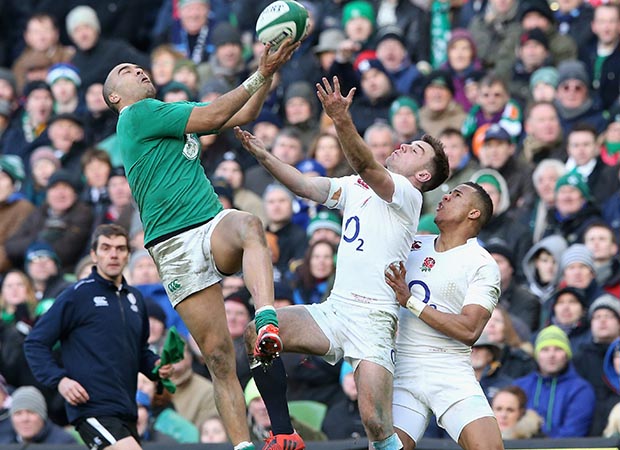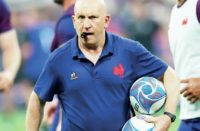 The England-Ireland World Cup warm-up game on September 5 has huge significance for both sides. The managements can spin this however much they like but it is a warm-up game with a difference because 95 to 100 per cent of those selected will be first-choice picks.
The England-Ireland World Cup warm-up game on September 5 has huge significance for both sides. The managements can spin this however much they like but it is a warm-up game with a difference because 95 to 100 per cent of those selected will be first-choice picks.
This is first against second in the Six Nations for the last two seasons, and the second-ranked side in the world against the fourth-ranked. It is also at Twickenham, anticipating a possible World Cup semi-final. The stakes are high.
The last time Ireland came to Twickenham they lost a close game in Joe Schmidt's first season as coach. Since then they have moved on and developed into an even more formidable opponent, as they proved by gaining revenge in Dublin last season.
This summer Schmidt and his English counterpart, Stuart Lancaster, have been in the same boat when it comes to selection, using their first two warm-up games to make good on their promises by giving every player in their squads a chance to prove themselves. In a way, they have had to chop and change to retain their integrity as coaches – even if the warm-up games are merely rubber-stamping the impressions they have already of the players at their disposal.
So far, Ireland have not been close to full strength in their summer games against Wales and Scotland, with Jonny Sexton, Conor Murray and Rob Kearney yet to play. England have also yet to show their full hand, with Brad Barritt not having made an appearance. Expect most, if not all, to be in the line-ups at Twickenham unless injured.
We will know the level of intent almost instantly in that game, because if both sides kick their penalties rather than kicking to touch for driving lineouts, they will be putting the result first and the performance second.
In an England v Ireland warm-up game with a great deal riding on it psychologically, that is perhaps understandable. However, I was surprised when France opted to kick their penalties against England in their first encounter at Twickenham last weekend. I cannot see what the benefit is when you lose a game and kick penalties. What do your players get out of that? The French coaches know that Morgan Parra can kick penalties, but they do not know whether they can score a try from a scrum 30 metres from England's line – and that is what they should have been attempting to do.
Schmidt appears to be formulaic regarding strategy, and even though he is less experienced at international level than Lancaster, his method has been extremely effective with two Six Nations titles already on the mantelpiece. The England head coach has been in charge for a few years with the same coaching team, and they have known most of their best line-up for some time. Now we will find out whether their preparation has been good enough.
England will carry a few more mental scars into this game than Ireland. Indiscipline and poor execution cost England in Dublin in February, and their coaches will have examined it forensically and identified the areas that didn't work for their team.
You would expect the high-ball to be countered mainly by Mike Brown at Twickenham, and for the back three to cope with the aerial attack from the likes of Tommy Bowe and Kearney better than they did last time. If Jonny May and Anthony Watson are the England wings, neither of them are short, and they know they have to stand up tall to the physical challenge.
Aerial competition and dominance is key for a modern winger, because if you cannot get up and safely catch – or knock back – a high ball your value is questionable. If your scrum-half puts the ball up you have to challenge for it successfully in attack in order to keep the momentum going, and in defence you have to be able to defuse their high kicks. Jumping and catching is the new X-factor – and England have to improve.
At the breakdown Ireland will fancy their chances against England, with the jackalling Sean O'Brien, Chris Henry and Rory Best leading the way in disrupting possession, and they are very accomplished at doing so. England's most effective counter is to clear out ruthlessly, and by now they will be aware that in Dublin the Irish were happy for English carriers to go to ground before they competed in numbers, spoiling and stealing successfully.
England could do worse than have a look at how David Pocock and Michael Hooper cleared out Richie McCaw and the New Zealand forwards during Australia's recent victory over New Zealand in Sydney.
However, the breakdown also needs urgent attention from referees, and that applies to the way all teams are treated, not just Ireland. If a player goes over the ball, and at any stage puts his hand on the ground while blocking the opposition from challenging for it, they should be penalised. The same applies if a knee touches the ground, or a player, because the law is clear that they must be supporting their own weight.
England have to acknowledge that poor discipline is unacceptable, plain and simple, and if an international team cannot learn from its mistakes quickly then there is something badly wrong.
It will be difficult to simply play this game with self-development in mind – and it could come down to playing what's in front of you, and finding a way to win. That is something that Ireland have been successful at under Schmidt.
He has given the Irish a focus by defining the role of each player in the team in detail. From there he has put together a very simple game plan based on winning territory, with a big aerial influence. It is a low risk approach, based on good discipline and a low error count. However, while Ireland may not have scored many tries in the last Six Nations, they showed in the final round against Scotland that when they needed to cut loose, they could.
Schmidt's other big gift is that, more than any other Ireland coach, he has made his players believe they are world class. You cannot achieve what he has through good luck – it is been about good players, and good planning, coaching and execution.
My view before the Six Nations was that every warm-up game was must-win for England, but I see it differently now. If your mentality is to try things, and change combinations, then you may be giving up an opportunity to win. If England lose to Ireland at Twickenham using a ‘performance-development' style, I don't believe that it would be psychologically damaging to them.
These are trial matches, and England – and Ireland – should be prepared to practise moves they will use against World Cup opposition. Some people say that you shouldn't show your hand, but the reality is that most teams have three or four options off a move. That means if you use one variation, they will still be guessing about the others.
It will be intense for both teams, but England should remember: Nothing ventured, nothing gained.


























